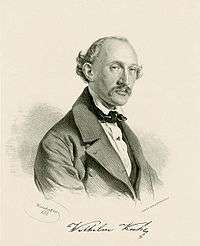Wilhelm Kuhe

Wilhelm Kuhe (10 December 1823 - 8 October 1912) was a German pianist and piano teacher, composer and administrator born in the city of Prague (modern-day Czech Republic), in the first half of the nineteenth-century.
Life
He exhibited a precocious taste for music, and at the age of four picked out Paganini's melodies on the pianoforte from memory.[1] He was taught music by Václav Tomášek, having Julius Schulhoff as a fellow student. He lived in Upper Austria in 1843-44, studying music and preparing for a concert tour with great success in 1844 at Linz, Salzburg, Innsbruck, Augsburg, Munich, and then at Stuttgart.[1] During his stay in Stuttgart in 1845 he made the acquaintance of a singer possessed of one of the most beautiful baritone voices he had ever had the pleasure to hear called Pischek.[1] They both visited London on the morning of May 1 that year and the following year he played with great success at Mr. Ella's Musical Union in Mayseder's trio. His first concert in London was arranged by Moscheles at the Beethoven Rooms on Harley street. In 1847, at the age of 24, he settled in England, dividing his time between London and Brighton, where he attained popularity as a pianoforte teacher, performer and promoter of concerts.
With remarkable enterprise and spirit, Kuhe showed great enterprise by establishing the annual festival at Brighton which was held by him as a joint conductor from 1870 to 1882, wherein he encouraged native talent by the new works composed at his instance and produced by him, among which, Virginia Gabriel's Evangeline in 1873; Barnett's cantata, The Good Shepherd, in 1876; Clay's Lalla Rookh in 1877 and 1878; Cowen's Deluge, and Cellier's Suite Symphonique in 1878; Walter Macfarren's overture Hero and Leander, Gadsby's Lord of the Isles, Wingham's Concert Overture in A, and Sloper's suite in 1879; Leslie's cantata, First Christmas Morn, A. H. Jackson's Ballet Suite and W. Macfarren's Symphony in B♭ in 1880: W. Macfarren's Konzertstück in B♭, played by Miss Kuhe, in 1881; Corder's orchestral Nocturne in 1882, in addition to The Woman of Samaria and The Martyr of Antioch, under the respective direction of their composers. He occasionally appeared in London, where he gave an annual concert in 1846. He was appointed a Professor of the Royal Academy of Music in 1886, position which he held until 1904. His numerous compositions include many drawing-room pieces, fantasias, and studies. He published also many transcriptions and songs.[2]
List of works
Fantasias
Études |
Salon music
Other works
|
See also
References
- 1 2 3 Wilhelm Kuhe, My Musical Recollections, pg. 14, Rinsland Press (2008), ISBN 1-4437-4343-7
- ↑ Mendel, Slovnik Naučny, iv. 1044, Wurzbach, Prague (1859)
- 1 2 G. Grove, A Dictionary of Music and Musicians, vol. 2, pg. 733, H.C. Coles, England (1890)
- 1 2 3 4 Theodore Baker, A Biographical Dictionary of Musicians, pg. 330, Baker Press (2008), ISBN 1-4437-2847-0
- Attribution
![]() This article incorporates text from a publication now in the public domain: "Kuhe, Wilhelm". Dictionary of National Biography. London: Smith, Elder & Co. 1885–1900.
This article incorporates text from a publication now in the public domain: "Kuhe, Wilhelm". Dictionary of National Biography. London: Smith, Elder & Co. 1885–1900.
Further reading
- My musical recollections, Rinsland Press (2008), ISBN 1-4437-4343-7.
- Royal Wedding March, Chappell & Co. London (1869). Pictorial colour lithograph with music by lithographic artist G. DesMaison
- Come Back to Erin (Words and music by Claribel), Ditson, Boston. Music score.
- Sparkling Shower. Caprice étude pour Piano. Music score.
- Slumber-Song and Tarantella from Auber's Masaniello. Music score.
External links
- The Henselt Library at European-American University Public domain scores of rare nineteenth-century piano music.
- IMSLP - Petrucci Music Library The free public domain music library.